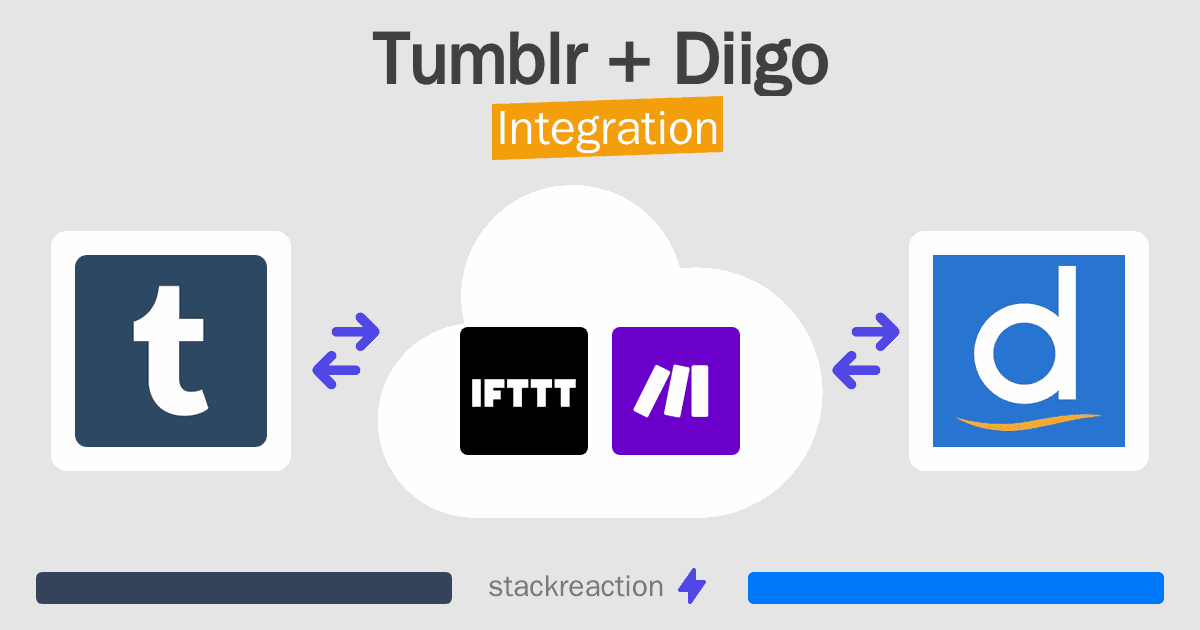How to connect Tumblr and Diigo
Workflow Automation Platforms supported by Tumblr and Diigo
Looking for an efficient way to automate your workflow processes between Tumblr and Diigo? These workflow automation platforms are designed to do just that - all without requiring any coding expertise. Browse through this list to discover the right fit for your business.
- Make.com. Make.com (Integromat) is a powerful automation tool that enables users to connect their favorite apps, services, and devices without any coding skills. With its unique features, users can automate even complex integrations easily and efficiently, saving time and effort. Integromat allows to connect apps and automate processes in a few clicks.
- IFTTT. IFTTT helps to create applications connections with a simple statement: if this then that. For example: "Tweet your Instagrams as native photos on Twitter". You define a task by a trigger and an action.
- Pricing Options
- FreemiumFree Trial
- Starting From
- 10$/month
- Pricing Options
- FreemiumFree Trial
- Starting From
- 5$/month
Tumblr and Diigo Integration Price
When it comes to optimizing your workflow and streamlining tasks, integrating Tumblr and Diigo can be seamlessly achieved using no-code or low-code automation tools. However, it is crucial to understand the pricing aspects.
We have gathered and organized pricing information for automation services that support Tumblr and Diigo integration. Refer to the table below for details on pricing based on 100, 1K, 10K and 100K basic automations per month.
Basic automation includes only one trigger and one action, making it simple. For instance, creating a record in database every time a task is completed is a basic automation.
| Automation Platform | 100 | 1K | 10K | 100K |
|---|---|---|---|---|
Volume: 100 Plan: Free $0 Volume: 1K Plan: Core $10.59 Volume: 10K Plan: Core $18.82 Volume: 100K Plan: Core $214.31 | $0 Free | $10.59 Core | $18.82 Core | $214.31 Core |
Triggers and Actions supported by Tumblr and Diigo
When integrating Tumblr and Diigo, you are usually looking for automation suitable for your business request.
Automations are workflows that link your applications to fully automate repetitive tasks. A Trigger serves as the initiating event of an Automation, while an Action denotes the event executed by the Automation.
We've taken great care in collecting every available Trigger and Action from multiple Workflow Automation Platforms, enabling you to evaluate integration possibilities and make an informed decision on connecting Tumblr and Diigo.
When this happens
Select a Trigger
Do this
Select an Action
How to setup Tumblr and Diigo integration
Step 1: Use a Workflow Automation Service that is compatible with both Tumblr and Diigo. Choose automation platform
60 seconds
60 secondsStep 2: Authenticate Tumblr and Diigo on the chosen automation service.
60 seconds
60 secondsStep 3: Select a Trigger for Tumblr that will initiate your automation flow. Explore Triggers
15 seconds
15 secondsStep 4: Choose a resulting Action for Diigo. Explore Actions
15 seconds
15 secondsStep 5: Specify the data that will be exchanged between Tumblr and Diigo by configuring the appropriate settings.
120 seconds
120 secondsStep 6: Complete your integration by testing and publishing it. You're all set!
More integrations to Tumblr
Take a look at the other popular Tumblr integrations that are available. Tumblr Integrations
More integrations to Diigo
Explore our list of other popular Diigo integrations to find new automation scenarios. Diigo Integrations
Tumblr and Diigo integration Diagram

Frequently Asked Questions
Does Tumblr integrate with Diigo?
- You can connect Tumblr and Diigo automatically using no-code Workflow Automation Tool. Use Make.com or IFTTT to link Tumblr and Diigo.
Can you Integrate Tumblr and Diigo for free?
- Yes, you can use the free plan of Make.com or IFTTT to connect Tumblr to Diigo for free, albeit with some limitations.

